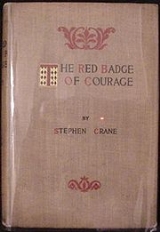
The Red Badge of Courage
Overview
War novel
A war novel is a novel in which the primary action takes place in a field of armed combat, or in a domestic setting where the characters are preoccupied with the preparations for, or recovery from, war...
by American author Stephen Crane
Stephen Crane
Stephen Crane was an American novelist, short story writer, poet and journalist. Prolific throughout his short life, he wrote notable works in the Realist tradition as well as early examples of American Naturalism and Impressionism...
(1871–1900). Taking place during the American Civil War
American Civil War
The American Civil War was a civil war fought in the United States of America. In response to the election of Abraham Lincoln as President of the United States, 11 southern slave states declared their secession from the United States and formed the Confederate States of America ; the other 25...
, the story is about a young private
Private (rank)
A Private is a soldier of the lowest military rank .In modern military parlance, 'Private' is shortened to 'Pte' in the United Kingdom and other Commonwealth countries and to 'Pvt.' in the United States.Notably both Sir Fitzroy MacLean and Enoch Powell are examples of, rare, rapid career...
of the Union Army, Henry Fleming, who flees from the field of battle. Overcome with shame, he longs for a wound—a "red badge of courage"—to counteract his cowardice. When his regiment once again faces the enemy, Henry acts as standard-bearer
Standard-bearer
A standard-bearer is a person who bears an emblem called an ensign or standard, i.e. either a type of flag or an inflexible but mobile image, which is used as a formal, visual symbol of a state, prince, military unit, etc.This can either be an occasional duty, often seen as an honour , or a...
.
Although Crane was born after the war, and had not at the time experienced battle firsthand, the novel is known for its realism
Literary realism
Literary realism most often refers to the trend, beginning with certain works of nineteenth-century French literature and extending to late-nineteenth- and early-twentieth-century authors in various countries, towards depictions of contemporary life and society "as they were." In the spirit of...
.

